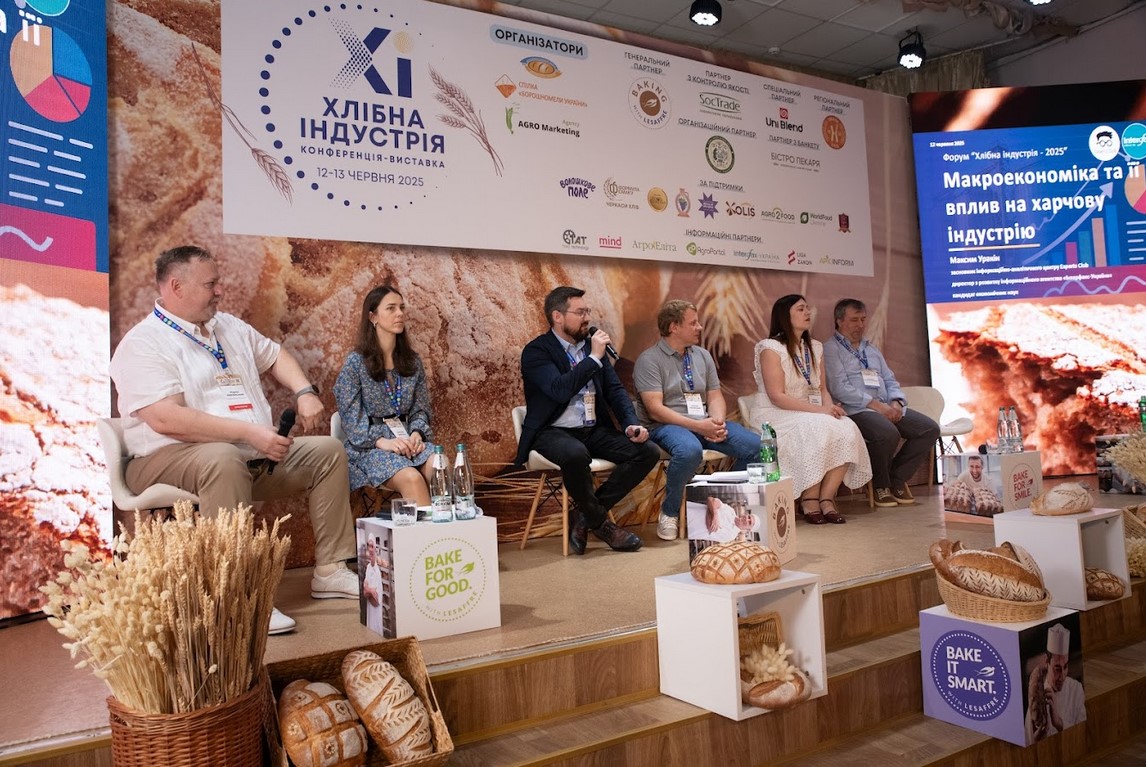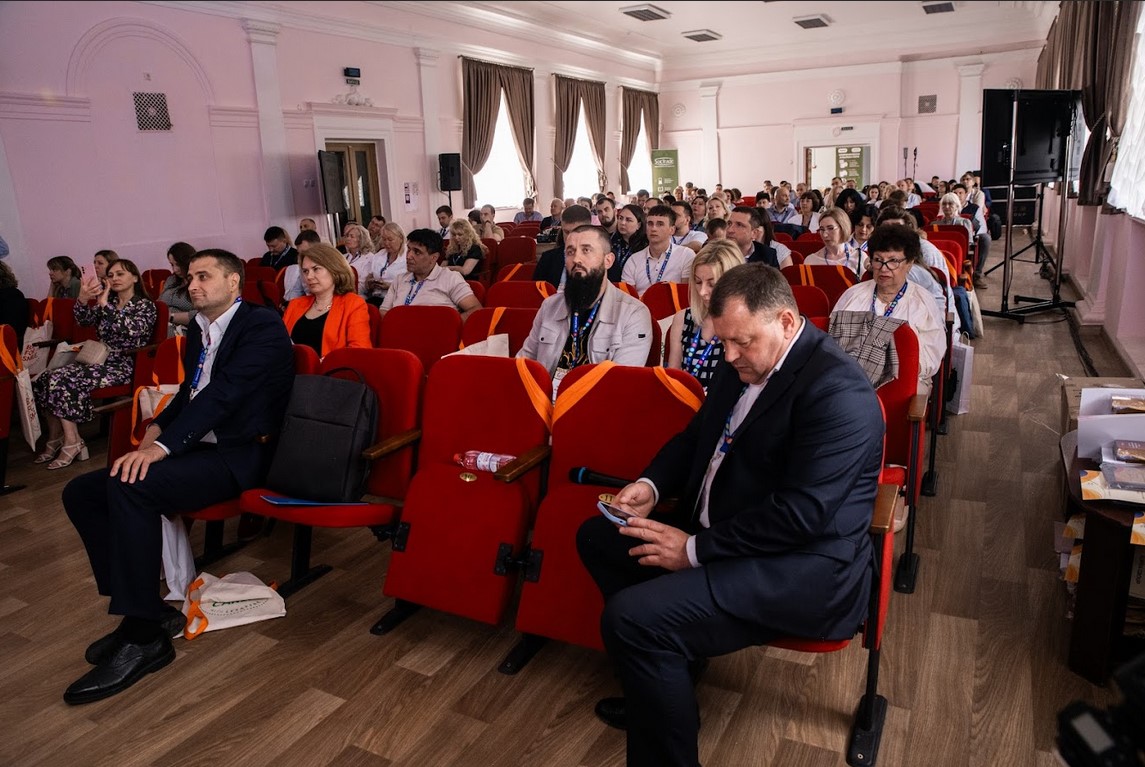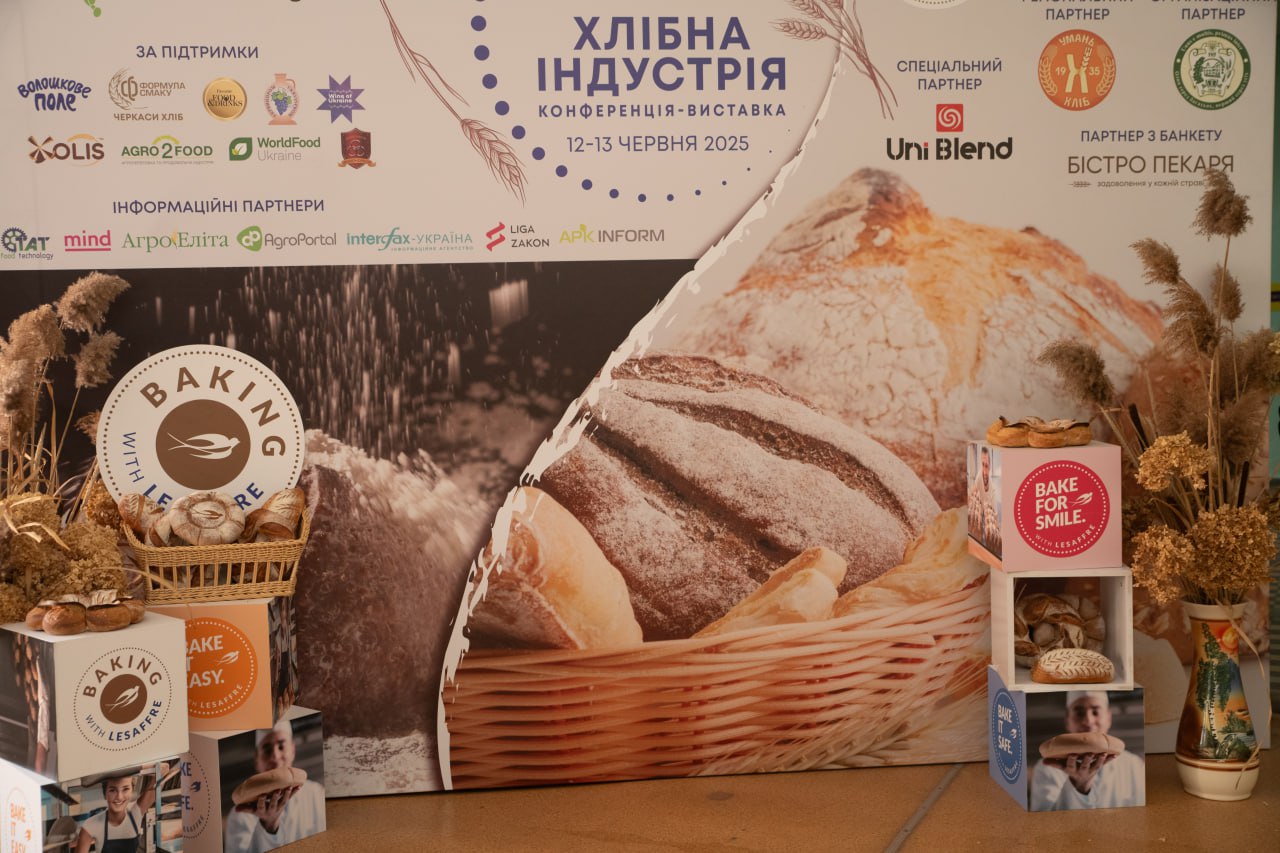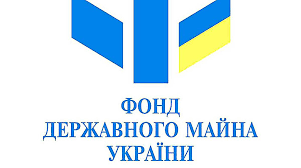
On June 12-13, Uman hosted a key industry event – theBread Industry 2025 business forum. More than 200 participants from all over Ukraine – business owners, technologists, analysts, government representatives, specialized associations and suppliers – gathered to outline a common vision of the future of the baking, flour milling and grain processing industries.
The event was organized by the All-Ukrainian Bakers Association, the Union of Millers of Ukraine and Agro Marketing Agency. This year’s event was hospitably hosted by Uman National University, one of the key agricultural universities in the country.
Lesaffre Ukraine was the general partner, SocTrade was the quality control partner, Uni Blend was a special partner, Umankhleb and Umanpyvo were regional partners, Baker’s Bistro was the banquet partner, and Experts Club was the official information and analytical partner of the forum. The forum was supported by Cherkasy Regional State Administration, OLIS, TM “Voloshkove Pole”, Cherkasy Bread, Wine of Ukraine, Food & Drinks, Ukrvinprom, Agro 2 Food, World Food Ukraine, Ukrkondprom. Interfax-Ukrainewas the official media partner.
The forum combined three thematic sessions, an industry discussion, practical insight sessions, master classes, and a solutions exhibition – the event was designed as a platform for the exchange of ideas, cases, and analytics that already affect business efficiency and sustainability.

Government position: dialog, support, forecasts
The first day of the forum was opened with a session on government policy and its impact on the processing industry. Taras Vysotskyi, First Deputy Minister of Agrarian Policy, presented an updated harvest forecast for 2025, as well as state support mechanisms available to processors. The focus was on the ministry’s openness to a systematic dialogue with the market, in particular to adapt programs to the real needs of enterprises.
Roman Kropyvnytskyi, Director of the relevant department at the Ministry of Economic Development and Trade, emphasized the importance of effective use of existing state support instruments, called on businesses to provide active feedback and stressed that strategic changes are possible only if all players in the chain cooperate.
Oleksandr Ignatov, Director of the Department of the State Labor Service of Ukraine, spoke about the upcoming updates to labor legislation, which should take into account the real labor relations between employers and employees. The topic aroused keen interest in the audience as it is directly related to the work of manufacturing companies.
There were constructive signals from the agrarian market: Andrii Dykun, Head of the UAC, focused on price risks and uneven margins in 2025 for wheat producers, and Oleksandra Avramenko, UCAB analyst, pointed out the challenges associated with the harmonization of Ukrainian legislation with EU standards.

Flour milling industry: export pressure and struggle for raw materials
The key focus was on the availability of milling wheat and the stability of the domestic flour market. Rodion Rybchynsky, Director of the Union of Millers of Ukraine, noted that with the beginning of full-scale armed aggression in Ukraine, flour production has significantly decreased and the structure of its exports has changed. Two issues are critical for the industry today: the availability of raw materials due to active wheat exports and the return of quotas on exports to the EU, which have become a key market for Ukrainian flour over the past three years.
In turn, Maksym Rychlovsky (Newsfera) drew attention to the loss of the domestic rye market – the crop has virtually ceased to be grown, which leads to import dependence in the production of rye flour and the risk of complete disappearance of the corresponding bread varieties.
Maksym Urakin (Experts Club, Interfax-Ukraine) analyzed the macroeconomic impact on bread production and consumption trends. He noted that in 2025, key macroeconomic indicators will again come to the fore. Inflation, projected at 12%, raises questions about the impact of costs on consumption. Changes in prices for certain products are noticeable in the country’s economy and can significantly change business models. At the same time, according to M. Urakin, the projected GDP growth of 2.9% opens up new prospects, but it is also necessary to take into account variations in the discount rate and the hryvnia exchange rate, which may aggravate the situation in the coming years.
Olena Lapshova (Lesaffre Ukraine) presented the international context: consumers expect not only environmental friendliness, but also confirmed evidence of quality, simplicity, and benefit from a product. These global trends will continue to influence the development of the Ukrainian industry, so today they should be taken as a benchmark for business development. Natalia Savosina (SocTrade) focused on full quality control – from field to shelf. Her presentation was devoted to technological solutions that ensure accuracy and safety at all stages of flour and bakery production.

Technology, marketing and new development priorities
The third session of the forum was dedicated to modern technological solutions and marketing approaches that shape the future of the bread industry. The session was moderated by Yuriy Duchenko, First Vice President of the UBA, Director of Kyivkhlib LLC. Opening the session, he noted that the quality of Ukrainian flour is not only a guarantee of stable domestic consumption, but also a key to success in foreign markets. The Ukrainian industry already has the potential to meet the highest standards, but it needs a unified vision and investment in quality stability and traceability.
Prof. Dmytro Zhygunov identified the main challenges related to the state of Ukrainian wheat, particularly in the context of baking properties. He noted that the industry needs a systematic analysis of the raw material base and a rethinking of the grain selection criteria, taking into account the intended use of flour.
Svitlana Shynkarenko, Head of Technology at Lesaffre Ukraine, PhD, in her speech described how freezing technologies not only optimize logistics or facilitate production forecasting, but also become a driver for creating an emotional product that meets the expectations of modern consumers. She paid special attention to the control of fermentation in freezing conditions, preservation of organoleptic properties and the role of yeast solutions in shaping the taste.
Sergiy Tsekhmistrenko, Director of Uni Blend, spoke about targeted technological solutions as an element of increasing the efficiency of bakery production. His report contained specific cases, such as the introduction of adaptive mixes to meet the requirements of a particular enterprise, modification of recipes to improve the stability of baked goods, and examples where the introduction of mixes reduced production losses and increased the yield of finished products.
Oleksandr Vereshchynskyi, Doctor of Technical Sciences, co-founder of OLIS, delivered a report that became a concentrate of strategic advice for owners and engineers of manufacturing enterprises: how to avoid common design mistakes, which components require the most careful attention, how to combine energy efficiency with grinding accuracy. He also emphasized the importance of integrating laboratory control into the real mill production cycle as a tool for sustainability and savings.
Olena Sinitsyna, founder of Favorite Food & Drinks, provided a practical guide to negotiating with foreign retailers: new requirements for documentation, logistics, recipes, price indexation and compliance with local regulations. She noted that Ukrainian producers have a good chance of securing contracts, provided they are flexible and professionally trained.
Bohdan Shapoval (Ukrainian Food Association) concluded the session by adding information on Private Label trends in the EU, the role of Ukrainian industry associations in promoting products, and the barriers that still need to be removed for sustainable exports. He emphasized that the new stage of cooperation with European networks is a challenge but also an opportunity for Ukrainian companies to become part of the global supply chain.
This block of the forum clearly demonstrated that technology and marketing are increasingly integrated. The future of the bread industry lies in personalized solutions, precise investments, flexible production and a systematic marketing presence in the market.
A game-changing discussion
The public discussion between bakers and retailers was a separate block. It was frank, dynamic, and sometimes conflicting – it was the culmination of the first day. The moderator was Lyudmyla Khomychak (Ministry of Agrarian Policy). The discussion centered on pricing, logistics, specifics of contracts and quality requirements. The participants agreed that this conversation should be regular and result in a revision of the procurement policy in terms of predictability and fairness of conditions for both parties.
Lesaffre intensive and Uni Blend master class
The second day of the forum was opened with an insight session by Lesaffre Ukraine. The participants worked in depth on optimizing dough preparation, innovations in fermentation, and efficiency in freezing bread products. After the session, the Uni Blend team held a practical master class at Uman National University, where they presented modern mixes, baking technologies and approaches to recipe adaptation.
The Forum “Bread Industry – 2025” has become an event that not only captures the problems, but also offers solutions – strategic, tactical and applied. It identified challenges, gathered the market on one platform, and launched important processes – from revising the procurement policy to updating technological approaches. A challenging marketing season, new trade rules with the EU and the fight for consumers lie ahead. But after the Bread Industry 2025, the industry will come out with new benchmarks. The next meeting will be held in 2026. And, given the dynamics, it will be even more ambitious.
Interfax-Ukraine is a media partner

International home furnishing chain JYSK on Thursday opened stores updated to the 3.0 concept in Kyiv and Uman, said Country Director of JYSK Ukraine Yevhen Ivanitsa.
“Updating our stores to the JYSK 3.0 format is not just a change in design, but a qualitatively new level of comfort for our customers. We invest not only in space, but also in impressions – we create an atmosphere that inspires to equip a home with Scandinavian coziness. We are confident that these updates will make shopping in Kyiv and Uman even more convenient and every visit to the store a pleasant event,” commented Ivanitsa.
The JYSK 3.0 format provides for an updated approach to store design, with a modern design, improved navigation, full spotlighting and increased space.
In particular, the store located in the April City shopping center (Kyiv, 19A Lesya Kurbasa Ave.) has increased both the sales and warehouse space, which allowed to expand the range of goods and improve logistics processes. The new retail space is 947 square meters, office space is 36 square meters, and warehouse space is 302 square meters. This JYSK store has been operating in Kyiv since 2014, and in November it celebrated its 10th anniversary.
The JYSK store in Uman (31a Velyka Fontanna St.) has increased its warehouse space at the expense of the sales area. The total area of the store is now 878 square meters, including 254 square meters of warehouse space and 47.83 square meters of office space.
Currently, JYSK Ukraine has 104 stores in 37 cities and the online store jysk.ua. JYSK in Ukraine has more than 800 employees.
JYSK is part of the family-owned Lars Larsen Group with more than 3.4 thousand stores in 48 countries.
JYSK’s revenue in the financial year 2023/24 amounted to EUR 5.6 billion.

Uman (Cherkasy region) to celebrate the Jewish New Year – Rosh Hashanah – has already arrived more than 33.5 thousand pilgrims, said the head of the regional military administration (OVA) Igor Taburets.
“As of now, more than 33,500 pilgrims have arrived in the city for the celebration. More guests are not expected. The situation is controlled. We do not record significant violations. Services are working in a reinforced mode,” he wrote in Telegram on Wednesday.
According to him, this year the arrival of a significant number of pilgrims-children has been recorded. The bulk of pilgrims traditionally come from Israel, so this year there are slightly fewer than usual due to the security situation not only in Ukraine, but also in Israel itself. “Some simply could not leave,” Taburets said.
“Both locals and visitors are urged to respond properly to air alerts, to follow the rules. We have curfew in effect without changes,” Taburets noted.

The State Property Fund of Ukraine (SPFU) has sold a complex of buildings of the Uman Correctional Colony for UAH 29 million at a privatization auction, which is 194 times higher than the starting price.
According to SPF Chairman Vitaliy Koval on Facebook, 42 companies and entrepreneurs participated in the auction. The starting price of the lot was UAH 149.4 thousand.
According to the results of the auction on the Prozorro.Sale website, the winner of the auction was Borys Pakholyuk. According to Clarity Project, he owns a number of agricultural enterprises and farms in Cherkasy and Odesa regions.
The lot includes a complex of non-residential buildings and structures with a total area of 3.1 thousand square meters and a land plot of 0.59 hectares. The property had not been used for more than 20 years.
Koval reminded that the Ministry of Justice transfers unused penitentiary institutions to the SPF for further privatization.

More than 35 thousand pilgrims arrived in Uman (Cherkasy region) to celebrate Rosh Hashanah, and no emergencies occurred, said Ivan Vygovsky, head of the National Police of Ukraine.
“Despite the increased risks and the large number of arrivals, law enforcement officers are keeping the situation under control, no emergencies have occurred,” Vygovsky said in a statement on the National Police telegram channel following his visit to Uman.
As noted, the police are working in an enhanced mode, three filtration points with baggage scanners, stationary posts, a visa support point, control and inspection groups have been organized, and the number of investigative teams has been increased.
A coordination headquarters consisting of representatives of the National Police, the National Guard, the State Emergency Service, the State Migration Service and other services is working around the clock.
“Police officers from the State of Israel are also on duty with our police officers, who arrived to strengthen security measures and help tourists,” the National Police said.
In 2023, Rosh Hashanah (Jewish New Year) is celebrated from September 15 to 17.

More than 30 thousand pilgrims are expected to arrive in Uman to celebrate Rosh Hashanah, which corresponds to the average rate of visitation in the period before the coronavirus pandemic and in peacetime, said the first deputy mayor of Uman Oleg Ganich.
“Travel agencies have already sold more than 30 thousand tickets for flights and to places of pilgrimage to Uman. Therefore, we expect more than 30 thousand pilgrims. This is the number of pilgrims who came to us before the coronavirus and in times of peace, when there was no war,” he said on the air of the national telethon on Wednesday.
At the same time, Ganich noted that the pilgrims are not stopped by warnings of danger from either the Israeli authorities or the Ukrainian authorities. “They believe that meeting the new year at the tomb of Tzadik Nachman guarantees them a happy, kind, cheerful and bountiful year,” he said
Last year, according to official figures, 23,000 pilgrims were registered, Ganich recalled. He noted that the official figures did not differ significantly from the actual figures – “200-300-500 people at most.”
In 2023, Rosh Hashanah (Jewish New Year) will be celebrated from September 15 to 17.